Brent Marchant's Blog, page 72
December 22, 2019
‘Honey Boy’ explores the mixed signals behind tough love
“Honey Boy” (2019). Cast: Shia LaBeouf, Lucas Hedges, Noah Jupe, Byron Bowers, Laura San Giacomo, FKA Twigs, Natasha Lyonne, Clifton Collins Jr., Mario Ponce, Martin Starr. Director: Alma Har’el. Screenplay: Shia LaBeouf. Web site. Trailer.
Growing up under strict parents can be difficult. Their dictates can be a lot to handle, especially when it seems like there’s no getting away from them. And it can be that much more challenging when they dole out seemingly unusual, wholly irrational demands, particularly when combined with questionable behavior and physical abuse. However, as troubling as such conditions may be, sometimes there is a method to that madness, even if it goes unexplained. Such seemingly “tough love” is often misinterpreted as something else entirely, its underlying intent obscured by surface considerations that overshadow what’s behind them. That’s the challenge to be unraveled by a disturbed young adult in the intense new drama, “Honey Boy.”
Set in 2005, “Honey Boy” presents the semi-autobiographical tale of writer-actor Shia LaBeouf’s stormy relationship with his father while growing up as a child star in Hollywood. The story, told through flashbacks to a decade earlier, examines the struggle of now-adult acting prodigy Otis Lort (Lucas Hedges) as he goes through rehab, a requirement to keep him out of prison after several violent skirmishes with the police. During his therapy sessions with his counselor, Dr. Moreno (Laura San Giacomo), Otis reflects back on his upbringing, when his younger self (Noah Jupe) seeks to cope with the many erratic moods and explosive tantrums of his unpredictable father, James (LaBeouf), circumstances that have resulted in a diagnosis of PTSD. Recalling these repressed memories is a painful process, to be sure, but it’s what it takes if Otis ever hopes to recover and set himself on a healthy new path for the future.

Former child star Otis Lort (Lucas Hedges) comes to terms with his troubled past while going through rehab in the new semi-autobiographical film, “Honey Boy.” Photo courtesy of Amazon Studios.
As the story unfolds, the elder Otis comes face to face with considerable anguish. He relives his childhood in a rundown motel complex with its many upsetting moments. At the same time, though, he also comes to see that he was the son of a father who generally stuck by him, despite his ample quirks and all through the many difficulties of their volatile relationship. This included Otis’s repeated “failures” in living up to his father’s expectations; their heated disagreement over Otis’s relationship with Tom (Clifton Collins Jr.), a volunteer from the Big Brother program, a protective venture recommended by Otis’s seldom-seen mother (Natasha Lyonne); and Otis’s eventual willingness to fight back and confront his dad on his bullshit, undoubtedly a source of his elder self’s eventual aggressive behavior. The emotional turbulence here was obviously ample and frequent, to be sure.
However, Otis also comes to realize that, no matter how tough James was on him, his dad always seemed to have his best interests at heart, even if it didn’t always appear that way. Having made many mistakes in his own life, James, a former and largely failed rodeo clown, pushes Otis hard in his work, because he recognizes his son’s talent and wants to see him succeed, to not make the same errors that he did. Granted, James’s methods didn’t always work, and he constantly struggled to stay sober after his own recovery, but he was present much of the time in his son’s life. The adult Otis seeks to reconcile these conflicted feelings, learning how to accept – and to forgive – his father for who he was and to thank him what he ultimately did for him.
Many of the themes that pervade this film echo those seen in another recent fact-based drama, “A Beautiful Day in the Neighborhood” (2019). Such topics as forgiveness, redemption and gratitude run through Otis’s story as he seeks to reconcile his feelings with his old man, much as they did for protagonist Lloyd Vogel (Matthew Rhys) with his estranged father, Jerry (Chris Cooper), in “Beautiful Day.” And here, as there, Otis finds his way with a supportive advisor, one who urges him to get in touch with – and to deal with – his feelings, difficult though that may be.

Acting prodigy Otis Lort (Noah Jupe, left) struggles with the many moods and quirks of his father, James (Shia LaBeouf, right), in director Alma Har’el’s latest offering, “Honey Boy.” Photo courtesy of Amazon Studios.
The process in both stories involves accessing the beliefs behind those feelings, the driving force in the manifestation of their respective realities. This is important to recognize, for this is the cornerstone principle of the conscious creation process, the philosophy that maintains we tap into these metaphysical building blocks in constructing the existence we experience. That’s precisely what Otis must do if he, like Lloyd, seeks to understand how and why his world unfolded as it did. It’s essential for him in appreciating how this made him the individual he has become and what he must grasp if he is ever to overcome his PTSD.
Again, like Lloyd, Otis underwent considerable pain, but, as he works his way through it, he also comes to grips with realizing how the experiences of his younger self helped prepare him for adulthood in a career as competitive as Hollywood moviemaking. He admittedly has his issues as a grown-up, but he also has a lot going for him. For instance, would success have come his way if James hadn’t pushed him to work so hard? That’s a question that probably can’t be answered definitively, but we do know for sure that he flourished in his career, in spite of – or perhaps because of – his challenged upbringing. Difficulty often helps to strengthen our tenacity, our willingness to succeed, to become who we were truly meant to be. In situations like that, a change in perspective, including rewritten beliefs about forgiveness, redemption and gratitude, may help us to connect the dots and realize how we became who we are, something for which we may even feel more than a little thankful.
This surprisingly good offering about a talented child star and his troubled father who uses tough love (sometimes a little too tough) to see his son succeed can be difficult to watch at times, given the harshness of his dad’s treatment. Some have also called the film somewhat self-indulgent, an argument not entirely without merit. However, director Alma Har’el’s latest also reveals how situations such as these aren’t necessarily black and white. Inventive cinematography and creative musical montages help to set this one apart from other similar releases, evoking heartfelt but not manipulative emotional responses. Think of this as a grittier, gender-switch, working class version of “Post Cards from the Edge” (1990), and you’ve got the idea what’s behind this one.

Shia LaBeouf delivers a revelatory performance as a character based on his own father in the new semi-autobiographical drama, “Honey Boy.” Photo courtesy of Amazon Studios.
Perhaps the greatest strength in this release is its performances. LaBeouf is a revelation, delivering an Independent Spirit Award-nominated supporting performance, one that’s far better than any other he has ever given. He’s backed by two fine portrayals by Hedges and Jupe, also an ISA supporting actor nominee, as well as a Critics Choice Award nominee for best young performer. The film also received additional Independent Spirit Award nods for best director and best screenplay.
Child-rearing receives more scrutiny today than perhaps ever before. Sensitivity to the welfare of kids under the thumb of dictatorial parents definitely deserves the increased attention it has received in recent years, especially for those living under the most vulnerable of circumstances. At the same time, those conditions must be examined carefully, for there may be more than meets the eye in such situations. This is by no means advocating unchecked torment, but, when the true meaning of what’s going on is explored, it may lead to a newfound understanding of what’s transpiring, for both parent and child – an awareness that can lead to the best outcome for all concerned, both during one’s upbringing and on into the future.

Copyright © 2019, by Brent Marchant. All rights reserved.
The post ‘Honey Boy’ explores the mixed signals behind tough love appeared first on Brent Marchant.
December 17, 2019
‘Beautiful Day’ extols the virtues of forgiveness
“A Beautiful Day in the Neighborhood” (2019). Cast: Tom Hanks, Matthew Rhys, Chris Cooper, Susan Kelechi Watson, Maryann Plunkett, Enrico Colantoni, Wendy Makkena, Tammy Blanchard, Noah Harpster, Christine Lahti, Carmen Cusack, Kelley Davies, Maddie Corman, Daniel Krell, Jessica Hecht. Director: Marielle Heller. Screenplay: Micah Fitzerman-Blue and Noah Harpster. Story: Tom Junod, “Can You Say… Hero?”, Esquire magazine, 1998. Web site. Trailer.
Forgiveness is one of the most renewing and fulfilling acts we can undertake. However, it can also be one of the most difficult and challenging endeavors we can pursue, especially when a loved one, such as a family member, is involved. Nevertheless, the rewards that come from such a compassionate venture can be immeasurable. Such is the case with a new fact-based film that explores this subject from the standpoint of fathers and sons, “A Beautiful Day in the Neighborhood.”
Hard-nosed investigative journalist Lloyd Vogel (Matthew Rhys) may be good at his job, but he’s not the kind of person who others readily warm up to. That’s especially true for the subjects of his Esquire magazine articles, who often feel worked over in the wake of his probing investigations. However, the gritty Gothamite has become so jaded by his work that he seems on the verge of burnout, not a good state of mind for the father of a newborn. That’s why a change of scene is very much in order, an opportunity that comes when he’s invited to attend the wedding of his sister, Lorraine (Tammy Blanchard). There’s just one hitch, though: In the wake of the invitation, Lloyd’s wife, Andrea (Susan Kalechi Watson), informs him that his long-estranged father, Jerry (Chris Cooper), will be there. Lloyd claims he’s cool with that, but his outward attitude is clearly concealing his real feelings under layers of irrefutable emotional camouflage.
Once at the wedding, Lloyd does his best to avoid interacting with Jerry, but they eventually run into one another, a tense encounter that quickly escalates and results in a fist fight. Lloyd’s not proud of his behavior, but he has no regrets, either. Nevertheless, after that incident, he’s no better off emotionally or psychologically than he was before the wedding.
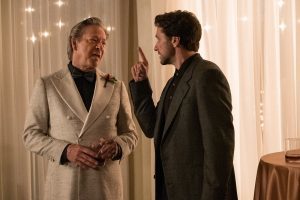
Long-estranged father, Jerry (Chris Cooper, left), and son, Lloyd (Matthew Rhys, right), experience a tense moment at a family wedding in the new fact-based drama, “A Beautiful Day in the Neighborhood.” Photo by Lacey Terrell, courtesy © 2019 CTMG, Inc.
Upon his return to work, Lloyd’s editor (Christine Lahti) tells him about the magazine’s upcoming edition, a special issue devoted to the subject of heroes. She then gives him his next assignment, a profile of children’s TV icon Fred Rogers (Tom Hanks). Lloyd is floored – and embarrassed – by the assignment, one far from typical of what he does. But Lloyd’s forced into taking it when his editor tells him that Mr. Rogers was the only one of the issue’s profile prospects who would agree to speak with him. And so, with his tail between his legs and a busted-up face, Lloyd travels to Pittsburgh to meet his subject – and a surprise destiny.
Skeptical that anyone can be as nice as Mr. Rogers appears to be, the cynical Mr. Vogel goes into his interview with a chip firmly planted on his shoulder. However, when conversing with the soft-spoken television host, Lloyd is intrigued by, but nevertheless somewhat uncomfortable with, his subject. That’s especially true when they switch roles and Mr. Rogers starts asking the questions, a skill the TV host was notably adept at. Lloyd’s family life proves to be a particularly sensitive topic for Fred’s questioning, so he gently, but persistently, probes his subject to get at the source of what is obviously some tremendous though long-buried, unresolved pain. In their sessions together, Lloyd invariably tries to withdraw, but he always keeps coming back, each time going deeper into his consciousness and coming to terms, albeit reluctantly, with the demons that haunt him. And, as time passes, remarkable developments occur. But who would have thought that a children’s television show host could work such wonders with a hard-edged reporter?
Through their conversations, Lloyd gets to see that Mr. Rogers is more than just a puppeteer who shares wise but simplistic observations with a juvenile audience. He comes to recognize that the gentle soul has much to offer in helping to bring people together, especially those who have been hurt and are much in need of healing. Lloyd gradually realizes that Fred Rogers, in his own quiet way, truly is a hero, one who treads lightly but courageously into troubled territory, surrounded by hostile parties, and carefully mends heavily damaged fences through loving compassion, practical sage advice, and warm, inviting smiles. The experience provides Lloyd with a fresh perspective, one that gives him a new outlook that carries over into myriad areas of his life. Indeed, who said Mr. Rogers was just for kids?

Hard-nosed investigative journalist Lloyd Vogel (Matthew Rhys, right) meets his unlikely interview subject, children’s TV icon Fred Rogers (Tom Hanks, left), in director Marielle Heller’s “A Beautiful Day in the Neighborhood.” Photo by Lacey Terrell, courtesy © 2019 CTMG, Inc.
Individuals living with circumstances like Lloyd’s often feel stuck. They see things as unchangeable, largely because those conditions arose out of events that themselves can’t be changed. Consequently, they become dug in, convinced that they’ll have to live with those arrangements for the rest of their lives.
But do they?
Based on the events depicted here, Lloyd’s circumstances are what they are because he believes them to be that way, and, given the strength and tenacity of those beliefs, they’ve anchored him into a mindset that seems unalterable. That’s not surprising, though, given that’s how the conscious creation process works, the philosophy that maintains our thoughts, beliefs and intents manifest the reality we experience. And, the more power we give to them, the more persistent they become, perhaps even stubbornly so. In light of that, then, is it any wonder that such conditions become pervasive and locked in?
But need that be the case forever? As conscious creators know, we choose the beliefs we hold, which inherently means that they’re capable of change – provided we allow that to happen. In Lloyd’s case, unfortunately, he’s become so ingrained in his thinking that he can’t see his way out of it. He’s holding on to the past hurts of his father abandoning his family and leaving them to fend for themselves during the hard times that followed, a particularly difficult period when Lloyd’s mother, Lila (Jessica Hecht), became ill and died. He’s unable to forgive Jerry, which is certainly understandable, but, in the end, who is Lloyd really hurting by so firmly and unrelentingly grasping that view?

Loving father Lloyd Vogel (Matthew Rhys, left) seeks to build a healthy, happy life with his wife, Andrea (Susan Kalechi Watson, right), and young son in “A Beautiful Day in the Neighborhood.” Photo by Lacey Terrell, courtesy © 2019 CTMG, Inc.
The irony in Lloyd’s outlook is that he’s alone in his family when it comes to that perspective. By virtue of the fact that his sister Lorraine invited their father to the wedding, she’s obviously changed her view and let go of the pain. Similarly, Jerry has made a concerted effort to get over the mistakes of his past, forgiving himself for his actions and seeking the same from his kids in an effort to reconnect with them, extending an olive branch that couldn’t have been easy to share. But Lloyd is dug in, unable – or unwilling – to change his stance. That is, until he meets Mr. Rogers.
Through a series of sensitive, kind, calm conversations, as well as various compassion-based exercises, Fred works with Lloyd to break down the previously intractable barriers, to help him reconsider and rewrite his beliefs. Mr. Rogers can clearly see that Lloyd wants to alleviate himself of the pain he’s been carrying around for so many years; he simply helps Lloyd see how to do it and what to replace those outmoded beliefs with. It’s a valuable tool for not only helping Lloyd change his relationship with his father, but also to alter his view of the world at large, making it possible for him to adopt a fresh perspective to see how his overall reality operates. Charting a new course for oneself can be life-changing when we’re stuck in a longstanding rut, and Lloyd at last has an opportunity to see how to make that happen.
At the core of this, obviously, is the matter of forgiveness. As many alternate thought practitioners maintain, forgiveness is an act that often benefits the individual who extends it as much as, if not more than, the person to whom it is extended. Holding on to the beliefs that prevent reconciliation from happening becomes an increasingly great burden over time, one that requires tremendous energy to maintain – energy that could certainly be put to far more productive purposes than holding a grudge. The catharsis that comes from forgiving thus eliminates the burden and frees up energy that has been locked away in a long-simmering and ultimately fruitless pursuit.

Hard-nosed investigative journalist Lloyd Vogel (Matthew Rhys, left) learns how to invoke a moment of stillness – a practice that can be successfully implemented any time and anywhere, even a busy Chinese restaurant – to go within and become introspective, an exercise taught him by children’s television icon Fred Rogers (Tom Hanks, right) in “A Beautiful Day in the Neighborhood.” Photo by Lacey Terrell, courtesy © 2019 CTMG, Inc.
Such is the stuff of redemption, which, in many ways, is little more than embracing a new choice for oneself. Granted, the scale and magnitude of the choice may be much greater than what’s involved in something as mundane as deciding what to have for dinner, but it nevertheless comes down to a central question of choice, one that opens new doors for the chooser and those whom this decision affects. There’s a lot to be said for a fresh start, and redemption makes that possible.
Forgiveness and redemption also provide us with much else to consider, particularly when it comes to evaluating why we went through what we did. For example, in Lloyd’s case, his difficulties growing up arguably did much to toughen him up and give him a thick skin – qualities that come in quite handy for someone aspiring to be an investigative journalist. And, given Lloyd’s success in his career, those attributes served him well in his work. Would such an outcome have occurred had it not been for the personal experiences he underwent during his upbringing? That probably can’t be answered definitively, but many professional success stories often cite their own life experiences as significant influences in how and why they achieved the results that they have.
Reflecting on such matters provides us with a new perspective on why we may have held on to some of the seemingly “unproductive” beliefs of our past. Such introspection helps to show us how we became who we have become. And, if our successes have arisen from such beliefs and resulting experiences, despite (or perhaps because of) the hardships, then there’s something to be thankful in that, perhaps even some gratitude that might not have been readily apparent at first glance.
While Lloyd did most of the heavy lifting in changing his life, Fred Rogers is certainly due his share of the credit for helping him turn things around. It’s impressive that he was able to work such wonders by simply engaging in thoughtful conversation, but words and ideas have tremendous power, tools readily capable of changing beliefs (and we can all see what that’s capable of). This came easily and naturally to Fred, and he was tremendously successful at it, but, then, that’s because he was engaging in his value fulfillment, the conscious creation concept associated with being our best and truest selves for the betterment of ourselves and those around us.

Children’s TV icon Fred Rogers (Tom Hanks) works his magic on an unlikely subject in the new fact-based drama, “A Beautiful Day in the Neighborhood.” Photo by Lacey Terrell, courtesy © 2019 CTMG, Inc.
Fred’s plainspoken but heartfelt wisdom left quite a legacy, one that we need in these troubled, noisy and polarized times. Through this film and the excellent documentary “Won’t You Be My Neighbor?” (2018), viewers are provided with an in-depth look at the TV icon’s insights, giving us an opportunity to see just how valuable they are for living, especially coping with the unsettling social climate we face today. It’s interesting to note how Mr. Rogers is relegated to a supporting role here, but that serves to illustrate the true power in what he espouses, that these “background” ideas, when brought to the surface, can have abundant impact in transforming the nature of the greater reality of which they’re a part. Such notions have the capability to truly manifest a beautiful day in “the neighborhood” at large.
Director Marielle Heller’s heart-tugging tale of redemption and forgiveness is the sort of soothing tale we could use more of these days. Hanks delivers an outstanding, exceedingly reverent portrayal of the legendary and unlikely television star, as does Cooper as the long-absent and now-penitent father figure. This heartwarming yarn’s innate predictability is creatively offset by a variety of inventive cinematic techniques and clever storytelling tactics, particularly in its whimsical production design, which lovingly mimics the low-tech sets of Rogers’ television show. Admittedly, the picture could have used a stronger male lead than Rhys, and the back story of the protagonist’s conflict with his father could have been fleshed out a little more, but the film otherwise comes through with a comfortable, calming likability that quietly but effectively makes its point without browbeating the audience.
As one watches “Beautiful Day,” one would swear that Hanks is channeling the spirit of Mr. Rogers. His effort has paid off, too, earning him best supporting actor nominations in the Golden Globe, Critics Choice and Screen Actors Guild Award programs. In addition, this fictionalized retelling of journalist Tom Junod’s experience and relationship with his soft-spoken but famous friend also captured a Critics Choice Award nomination for best adapted screenplay.

In this holiday season, when the spirit of goodwill tends to be on everyone’s mind perhaps a little more than at other times of the year, it helps to have films like this to remind us of the power of forgiveness. It may seem a little strange that someone as unlikely as Mr. Rogers can so pointedly show us the rewards that come from invoking it in our lives. But, if doing so can help to bring peace of mind to the weary among us, there’s certainly something remarkable to be said for that.
Copyright © 2019, by Brent Marchant. All rights reserved.
The post ‘Beautiful Day’ extols the virtues of forgiveness appeared first on Brent Marchant.
December 15, 2019
Now on iHeart Radio!
The Good Media Network is pleased to announce that its podcasts are now featured on iHeart Radio! Fans of Frankiesense & More can find it by clicking here. And those interested in TGMN’s sister broadcast, Mission Unstoppable, can find it by clicking here. Archived editions of past shows are available on both links, including the Movies with Meaning segments featuring yours truly. So, if you’re looking for a current show or you missed a past episode, or if you just want to go back and listen to your favorites again, check out the iHeart sites and enjoy!




The post Now on iHeart Radio! appeared first on Brent Marchant.
This Week in Movies with Meaning
Reviews of “A Beautiful Day in the Neighborhood,” “Honey Boy,” “The Report” and “By the Grace of God,” as well as a podcast update, are all in the latest Movies with Meaning post on the web site of The Good Media Network, available by clicking here.


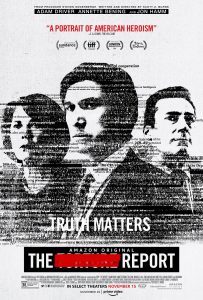
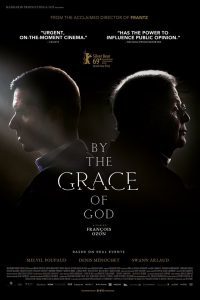

The post This Week in Movies with Meaning appeared first on Brent Marchant.
December 14, 2019
‘The Report’ chronicles the heroic pursuit of an ugly truth
“The Report” (2019). Cast: Adam Driver, Annette Bening, Corey Stoll, Jon Hamm, Maura Tierney, Michael C. Hall, Tim Blake Nelson, Linda Powell, Victor Slezak, Scott Shepherd, John Rothman, Ted Levine, Douglas Hodge, T. Ryder Smith, Fajer Kaisi, Zuhdi Boueri, Ratnesh Dubey, Carlos Gómez, Pun Bandhu, Joanne Tucker, Ian Blackman, Damian Fumusa, Joseph Siravo, Jennifer Morrison, Alexander Chaplin, Evander Duck Jr., Matthew Rhys. Archive Footage: Barack Obama, Dick Cheney, Donald Rumsfeld, John McCain, John Kerry. Director: Scott Z. Burns. Screenplay: Scott Z. Burns. Story: Katherine Eban, “Rohrschach and Awe,” Vanity Fair magazine, July 2007 (uncredited). Web site. Trailer.
Exposing a painful truth is never easy. That’s especially the case when those who have much to lose hinder the process by nefariously intentional interference to conceal its ugly revelations. Thankfully, though, there are those who are staunchly committed to seeing that justice, honesty and integrity are served, a quest detailed in the riveting new historical drama, “The Report.”
Things changed considerably for many individuals and institutions in the wake of the 9/11 terrorist attacks. For Daniel J. Jones (Adam Driver), that meant an alteration in his career path. He felt a need to become involved in something that would make a difference in the aftermath of that horrendous day, so he sought work in the intelligence field. He spent several years amassing experience with the FBI before becoming a Senate staffer working for Sen. Dianne Feinstein (D-CA) (Annette Bening). In this new capacity, Jones was charged with investigating the government’s Enhanced Interrogation Techniques (EIT) program, a controversial initiative implemented by the Bush Administration to use new methods for drawing out information from suspected terrorists.
Through a series of flashbacks, the genesis of the EIT program is detailed to illustrate what Jones was assigned to investigate. Viewers witness examples of such techniques as waterboarding, extreme sleep deprivation and even simulated coffin burials that government officials employed in hopes of extracting vital information about terrorist organizations and their plans for possible future attacks. However, given the questionable techniques used, it became widely apparent that they constituted torture, going beyond what were generally considered acceptable interrogation practices, measures seen as unacceptable for a nation that claimed to represent itself as the pinnacle of justice and fair treatment of prisoners.

Fearless and idealistic crusaders Sen. Dianne Feinstein (D-CA) (Annette Bening, left) and Senate staffer Daniel J. Jones (Adam Driver, right) seek to exposure the dark secrets of the CIA’s Enhanced Interrogation Techniques (EIT) program in the wake of the 9/11 terrorist attacks in the gripping new fact-based political thriller, “The Report.” Photo by Atsushi Nishjima, courtesy of Amazon Studios.
But the severity of the treatment was not the only problem. Due to the intensity of the techniques and the perceived need to repeat them – sometimes as many as 186 times – to draw out crucial information, it became an expensive program, especially given the many suspects who were apprehended and interrogated. Even more distressing, though, was the fact that the techniques didn’t work; suspects ended up saying anything to get the torture to stop, which meant that government officials were being told lies or were being supplied with information already in their possession. The suspects themselves often weren’t who they were believed to be, and, even if they were involved with terrorist groups, they were usually low-level participants far from the big players the government thought it had captured. (So much for the effectiveness of a supposedly “better” approach.)
Jones, who initially believed that the government should do whatever it could to keep the public safe, gradually had a change of heart the further he got into his investigation. He came to see the fiscal waste, the inhumane treatment and the undeniable ineffectiveness of the program up close and in great detail. While many in the Bush Administration saw it as an essential element of its antiterrorism efforts, Jones and Feinstein came to realize it was nothing more than a huge, expensive embarrassment for the nation, one that didn’t yield any new or meaningful intelligence – and that ultimately didn’t prevent any of the alleged attacks that were supposedly in the works. Even the eventual capture of alleged 9/11 mastermind Osama bin-Laden came about as a result of information derived from sources other than those subjected to the EIT program.
Amassing these findings wasn’t easy, either. The CIA, the driving force behind the EIT program, was less than cooperative, implementing measures that hindered the investigation. For instance, the agency refused to allow its staff members to be interviewed. Thus, to get the information he needed, Jones was forced into sorting through voluminous emails and other archived communications, a tedious and time-consuming process for someone with limited staff to assist him. What’s more, all of this work had to be conducted at a clandestine CIA facility from which nothing could be removed under penalty of prosecution.
Understandably, Jones became frustrated by the process, especially when he uncovered increasingly damning evidence about the program. Opposition from the intelligence community, backed by sympathetic (some would say collaborative) parties within other branches of government (including Congress), stifled Jones’s efforts. In addition, to dilute and counter whatever credibility he was beginning to develop, those seeking to protect the program made sure its supposed accomplishments were sufficiently trumpeted in the media, a move aimed at solidifying public support. This even became evident through entertainment vehicles like the film “Zero Dark Thirty” (2012), a Hollywood production detailing the “official” events involved in the raid on bin-Laden’s secret compound in Pakistan.

Having written a nearly 7,000-page report about the dark secrets of the CIA’s Enhanced Interrogation Techniques (EIT) program, Senate staffer Daniel J. Jones (Adam Driver) struggles to get the document released in the face of strong opposition in director Scott Z. Burns’s new political thriller, “The Report.” Photo by Atsushi Nishjima, courtesy of Amazon Studios.
For Jones, this exercise was an eye-opener. As someone who initially firmly believed in the government’s official efforts, he gradually became disillusioned, even angry, at what he found. Keeping his composure in light of his mission became increasingly difficult, especially when attempts at keeping his findings from being revealed were ramped up and officially sanctioned by members of Congress. Such was the case not only during the Republican administration of George W. Bush but also during what was seen as the supposedly friendlier Democratic administration of Barack Obama. These increasingly onerous obstacles eventually drove him to consider actions that placed his own career in jeopardy in order to make the truth known. He risked the possibility of prosecution for his ideals – and those of what he believed were the nation’s as well.
Fortunately, throughout this process, Jones had Feinstein’s backing, a fierce level of support that gave him what he needed but that simultaneously threatened to damage her own clout and credibility. Nevertheless, Jones and Feinstein were committed to release their nearly 7,000-page report, a battle that pitted them against powerful Washington influences and prompted them to seek the assistance of some seemingly unlikely allies, including those on the other side of the political aisle. To them, the truth was more important than any potentially embarrassing consequences that might emerge from these revelations. But, then, for a nation that claims to stand as a shining example of democracy for the world, this was seen as essential to minimize the damage wrought by the questionable deeds and blatant hypocrisy that led them to this point.
The 9/11 tragedy took so many of us by surprise that we were unsure how to react. Some were afraid and desperately wanted security. But not everyone was in agreement on how to go about attaining it. Many sought safety while preserving justice. Others, however, pursued protection at any cost, even if that meant resorting to vengeful and questionable tactics. Admittedly, this was new territory for virtually everyone, so coming to consensus on how to proceed was far from easy, especially on what approaches to employ. The differences among us were driven by our individual beliefs, and that’s significant, for they dictate how events unfold, the result of what happens through the conscious creation process, the philosophy that maintains we draw upon those notions in manifesting the reality we experience. And, as this film shows, the variances in beliefs were great, a disparity that accounted for the diverse outcomes that resulted while addressing the aforementioned need for security.
Many Americans wanted to be safe but to achieve that security through tough but fair and just means. That’s exemplified here by Jones’s sincere idealism. However, there were also those who believed in attaining protection by any means possible, even if by unapologetically tapping into more ruthless tactics driven by qualities like vengeance and vindictiveness. And that outlook is apparent here in the attitudes and practices of those in power, those who, at least initially, wielded the greatest and most readily deployable reserves of metaphysical and tangible resources needed for effectively and clandestinely carrying out such plans. Those methods were artfully clothed in zealous, patriotic rhetoric designed to cultivate the support of a wary but grateful public that was intentionally shielded from knowing the truth about what was really going on. Had citizens known what their elected officials were really up to – and how their tax dollars were being spent – they may not have been so willing to give their leaders a blank check to provide them with the security they sought, especially since that protection didn’t come about as a result of those questionable tactics in the first place.

Risking her reputation to fight for the release of a document critical of the intelligence community, Sen. Dianne Feinstein (D-CA) (Golden Globe Award best supporting actress nominee Annette Bening) stands her ground in the face of significant opposition in “The Report,” now available for streaming on Amazon.com. Photo by Atsushi Nishjima, courtesy of Amazon Studios.
This is where the work of Jones and Feinstein became so important. They sought to expose the deception, the atrocities and the waste involved in the EIT program. They believed in providing security to the public, to be sure, but they also believed in upholding the principles that the country claimed to stand for in achieving that goal.
Jones and Feinstein faced many obstacles in bringing that information to light, but they had something going for them in their beliefs that their opponents didn’t – integrity. They were being honest with themselves and their constituents in how and why they went after the evidence they sought. They believed in being above board and making sure their investigation and its findings reflected that. Their results bore that out, too.
Meanwhile, those who developed and implemented the EIT program ultimately failed because it arose out of beliefs and assertions that were innately short on integrity. On some level, they knew their tactics didn’t align with the ideals that America stood for, even if they tried using the terrorist threat to “justify” what they were doing. It probably had something to do with why they also fiercely tried to keep information about the program under wraps, rationalizing their efforts as being in the interests of national security, even though that undertaking probably had more to do with keeping their merciless practices from seeing the light of day. But, then, those outcomes shouldn’t come as any surprise from a plan that arose from beliefs based on a fundamental lack of integrity to begin with.
Even if the developers of the EIT program were to believe in the validity of what they were doing, their efforts nevertheless reflect the practice of un-conscious creation or creation by default. This occurs when we are so focused on using our beliefs to attain a particular goal that we give no credence to the consequences that can result from our efforts. By paying no attention to the fallout that can come from implementing a particular initiative, we run the risk of overlooking, and subsequently experiencing, all manner of unintended side effects. Those behind the program no doubt discovered that when one of their subjects died as a result of their practices, an outcome that they were convinced couldn’t happen. Yet, when their victim ended up succumbing to the injuries they inflicted upon him, he was nevertheless dead, despite supposed assurances to the contrary.
Given what Jones and Feinstein were up against, making meaningful progress required some creative thinking. First, they had to overcome whatever fears they might have had. Considering that they were facing the considerable power of the intelligence community, it’s not too hard to believe that they could have easily been intimidated. It was essential that the investigators dispense with any fear-based beliefs that might hold them back. That meant embracing courageous and heroic perspectives as they proceeded in their efforts.
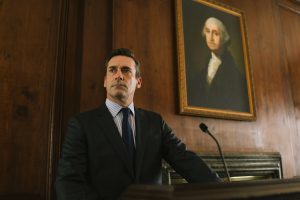
Denis McDonough (Jon Hamm), Chief of Staff to President Barack Obama, walks a tightrope to accommodate the needs of those with differing political agendas in the new fact-based drama, “The Report.” Photo by Atsushi Nishjima, courtesy of Amazon Studios.
Then there was the need to become innovative in their thinking. Given the expert manipulative prowess of intelligence operatives, Jones and Feinstein faced the real possibility of being deceived, misdirected and stonewalled in their work. This thus called for employing inventive strategies and practices, such as drawing upon the information embedded in agency emails and cables in lieu of evidence gleaned from in-person interviews with those who participated in the program. They also drew heavily upon information online, some of which was surprisingly revelatory (perhaps even to the CIA itself). These approaches may have been more time-consuming and arduous, but they nevertheless yielded vast veins on intelligence gold – material that, had it not surfaced, wouldn’t have given the investigators what they needed to prepare their report.
The same was true when government insiders tried to block the release of Jones’s report, an initiative driven largely by partisan considerations. To counter this, Feinstein saw the need to step across the political aisle and recruit Republican support, an effort that earned her the backing of Sen John McCain (R-AZ). With the investigation now receiving bipartisan support – especially with that of two highly influential Senators from different political camps – opponents of the release of its findings found it more difficult to find friends who would give them and the program unlimited cover.
Most of all, though, the work of Jones and Feinstein reveals their commitment to their personal value fulfillment, the conscious creation concept associated with being their best, truest selves for the betterment of themselves and the world at large. The investigators were dedicated to exposing the truth about the EIT program, even in the face of potentially high political and career costs. They were convinced that it was the right thing to do, no matter how challenging, and they pursued it with unflinching zeal, even when the going got tough. Those who claim to call themselves true defenders of American ideals should thank them for what they did – for exposing an ugly and hypocritical incident in our nation’s history and making a betrayed public aware of what really went on.
This meticulously detailed, methodically explained history of the efforts to prepare the controversial Senate report is one of the year’s most underrated offerings. Its excellent performances by Driver, Golden Globe Award nominee Annette Bening and a fine ensemble of supporting players enliven a story that otherwise could have been potentially tedious. The picture’s razor-sharp script not only delivers the facts, but it does so with edgy wit and just the right amount of cynicism to expose the true nature of what was really going on during a turbulent period in the nation’s history, when ethics were placed on the chopping block in favor of expediency and the fulfillment of dubious agendas. It’s a smart, savvy, eye-opening offering that every truly loyal American should see.

Unfortunately, “The Report” has not received the notoriety and attention it deserves. The movie played the film festival circuit during the fall, followed by a limited (and all-too-brief) theatrical run. Thankfully, the picture is now available for streaming on Amazon.com.
For all of the Daniel Joneses of the world, there are those who would willingly do just the opposite of what he sought to accomplish. That’s unfortunate, too, for every scandal and misdeed that remains unexposed hurts us all in the long run. Given that, we can only hope that the courageous crusaders among us find the wherewithal – and the support – to step up and pursue their destiny, to shed light on the darkness and make it apparent for all to see. That’s truly heroic, a quest to which we should all aspire.
Copyright © 2019, by Brent Marchant. All rights reserved.
The post ‘The Report’ chronicles the heroic pursuit of an ugly truth appeared first on Brent Marchant.
December 8, 2019
‘Grace of God’ examines the struggle to liberate trapped courage
“By the Grace of God” (“Grâce à Dieu”) (2018 production, 2019 release). Cast: Melvil Poupaud, Denis Ménochet, Swann Arlaud, Eric Caravaca, François Marthouret, Bernard Verley, Martine Erhel, Hélène Vincent, François Chattot, Frédéric Pierrot, Aurélia Petit, Julie Duclos, Jeanne Rosa, Amélie Daure, Nicolas Bridet, Pierre Lottin, Stéphane Brel, Martine Schambacher, Max Libert, Nicolas Bauwen, Laurence Roy, Jacques Lagarde, Davan Collin, Jules Gauzelin, Noah Richard. Director: François Ozon. Screenplay: François Ozon. Web site. Trailer.
Working up the necessary courage to conquer fears that we believe cannot be vanquished can be one of the most difficult and terrifying challenges we can undertake. The effect can be paralyzing, leaving us stuck in a hellish limbo that feels like it has no end. But, with the right perspective, that need not be the case as a group of victimized individuals discover for themselves in the new fact-based French drama, “By the Grace of God” (“Grâce à Dieu”).
Middle-aged family man Alexandre Guérin (Melvil Poupaud) appears to lead a happy life with his wife, Marie (Aurélia Petit), and his five children in Lyon, France. But lurking beneath the veneer of happiness lies a dark secret that he has rarely revealed – that he was sexually abused by a priest, Fr. Bernard Preynat (Bernard Verley), while growing up. The series of indiscretions occurred primarily while Alexandre was at a church-sponsored scout camp in Ireland at which Fr. Preynat served as counselor – and resident predator. It’s something that has haunted Alexandre ever since.
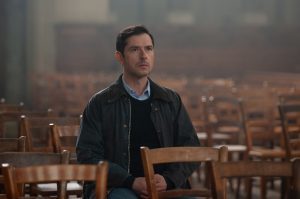
Middle-aged husband and father Alexandre Guérin (Melvil Poupaud) struggles with his memories of childhood abuse at the hands of a priest in the new fact-based drama, “By the Grace of God” (“Grâce à Dieu”). Photo courtesy of Music Box Films.
When Alexandre learns that his aging abuser has escaped prosecution in the time since then – and that Fr. Preynat has always been transferred to a new parish whenever issues arose – he’s appalled, especially when he hears that the troubled priest has been reassigned yet again to a new venue in which he’s charged with teaching Bible study classes to young children. He decides to take action by speaking up and calling out the abuses to the head of the diocese, Cardinal Barbarin (François Marthouret), hoping that it will lead to some kind of action. He gives a detailed, explicit statement to the Cardinal’s aide, Régine Mayor (Martine Erhel), who arranges an intervention between Alexandre and Preynat. At that meeting, the victim confronts his perpetrator, who freely admits his acts but who refuses to apologize.
Needless to say, Alexandre is left disappointed. Upset at the outcome, he arranges to meet the Cardinal in person. He sympathizes with Alexandre’s plight, but he refuses to take any action that might damage the church’s reputation with the public, a decision that further outrages the aggrieved victim. Alexandre thus decides to take matters into his own hands, a plan that he hopes will result in prosecution.
In launching this effort, however, Alexandre learns that he, like many other of Preynat’s victims, is unable to bring suit, because the 20-year statute of limitations has run on whatever potential claim he might try to make. If he’s to get any meaningful results, he needs to identify others who are still eligible to legitimately file a claim.
Alexandre begins his quest by networking with others, starting with his friend Olivier (Nicolas Bridet), who was also abused. Through connections developed by the two of them, they find others who were also victimized by Fr. Preynat, most notably Gilles Perrot (Eric Caravaca) and François Debord (Denis Ménochet), who take the lead in establishing a formal victims’ network on the Internet. This, in turn, brings them into contact with Emmanuel Thomassin (Swann Arlaud), a victim whose statute of limitations has not yet expired. At Last, Alexandre, Gilles and François have found someone who can bring a valid and timely case.

Childhood sexual abuse victims Alexandre Guérin (Melvil Poupaud, left), François Debord (Denis Ménochet, center) and Gilles Perrot (Eric Caravaca, right) organize an Internet-based victims’ network to connect others affected in “By the Grace of God” (“Grâce à Dieu”). Photo courtesy of Music Box Films.
Emmanuel is troubled by his experience, it having left him saddled with a variety of personal problems, both physical and psychological. However, he summons up the courage to make a statement to the police, an investigation led by Capt. Cousteau (Frédéric Pierrot), who aggressively seeks to prosecute. Justice, it seems, may at last be on the way.
Of course, Preynat is not the only one on the hook. When word begins to circulate that his superiors knew what was going on and took no action – despite Preynat’s pleas for help to them about his problem – suddenly the church hierarchy gets put under the microscope. And, as the victims’ network turns up the heat, what began as one man’s search for justice turns into a full-blown public scandal, with considerable consequences on the line.
The issue of predatory priests has affected Roman Catholic dioceses around the globe, and the fallout has been extensive, especially in light of the church’s delayed and inadequate responses to the problem. It has become the subject of widespread media coverage, and the story has made its way into a number of films, such as this one, as well as the Academy Award winner for best picture, “Spotlight” (2015). It’s a story that has shaken the faith and trust that many have long placed in this centuries-old religious institution. However, the human cost of this travesty has not surfaced in detail as much as it has through this picture, bringing the question down to a more personal scale than perhaps any of the other treatment of this subject thus far.
Many of the personal considerations that this film raises concern basic issues of how individuals in their developmental years relate to the world around them. In this crucially formative age, they learn the ways of the world and form beliefs about how it works and what their role in it should be. These beliefs are critical, for they shape their holders’ views of reality and how it unfolds, especially where matters involving their relationships to authority figures are concerned. They learn about concepts like obedience and conformity and what it takes to comply with them, based on what people they come to trust tell them to do – even if what they’re told is not in their best interests.
This is important because what transpires helps to set their belief patterns for living, for the manifestation of their existence, the core principle underlying the conscious creation process, the philosophy that maintains we draw upon these metaphysical building blocks in the materialization of our world. And, given the fact that they have been intentionally led to believe that the heinous acts inflicted upon them are perfectly acceptable by those they’ve been taught to trust implicitly, the deception they’ve been falsely guided into embracing makes the crimes that much more odious.
For the victims who were so horribly misled, this abomination has created a number of problems. To begin with, it has caused them to accept beliefs in the validity of the abhorrent acts perpetrated against them. In turn, that has led them to embrace a belief formation process – and, subsequently, a view of reality and its creation – that’s far from healthy. And, once they discover what’s been allowed to transpire, they’re left confused, disillusioned, betrayed and damaged in countless ways, affecting them psychologically, emotionally, and, in some cases, physically.

Emmanuel Thomassin (Swann Arlaud), a childhood sexual abuse victim still eligible to file suit against his perpetrator, contemplates how to proceed in director François Ozon’s “By the Grace of God” (“Grâce à Dieu”). Photo courtesy of Music Box Films.
For many of the victims, once they learned these painful truths, they were stricken in fear. They were unable to come forward for various reasons. Some were ashamed of their behavior and were reluctant to admit it, even though they did not initiate it. Others were afraid to speak up for fear of the implications that could come for calling out authority figures, particularly authority figures who they had been taught to trust. And still others feared the power of an institution that they believed could come down on them for becoming whistleblowers, with ramifications that included everything from ridicule to perhaps even the fate of their eternal souls.
To rectify this situation, however, the victims had to learn how to overcome these fears, to be willing to step up and call out those who abused them. This meant rewriting their beliefs about their fears and replacing them with courage-based notions that would give them the strength and conviction to do what it would take to speak their minds and publicly identify the perpetrators, as well as their enablers and collaborators.
This was not easy, to be sure. Through flashbacks involving their younger selves (Davan Collin, Jules Gauzelin, Noah Richard), Alexandre, François and Emmanuel relive what happened to them, this time with a new awareness of what took place in light of their new beliefs. In addition to bolstering themselves in the face of these heightened apprehensions, the victims also had to muster the courage needed to face the blowback that would come from their actions, particularly in such a staunchly Catholic nation as France, where the institution has long enjoyed virtually unflinchingly blind public support. The challenge in that, obviously, was considerable.
What’s more, the victims not only faced opposition from the church, but also from sources closer to home. Immediate family members, such as Alexandre’s parents (Laurence Roy, Jacques Lagarde) and François’s parents (Hélène Vincent, François Chattot), were unsupportive – sometimes even critical – of their sons’ activism. At the time of the abuse, their parents were generally indifferent or unwilling to do anything, even when they had their own suspicions, either because they didn’t want to make waves or out of fear of what the church might do to them. And, when their sons spoke up as adults, their support was lacking or tepid; Alexandre’s parents encouraged him to let go of what happened all those years ago, hoping that the situation would just go away; and François’s parents, though upset at what transpired and embarrassed by their lack of past oversight, were noticeably uncomfortable with everything coming to the surface and in the bright light of day.
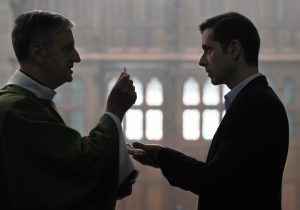
Sexual abuse survivor Alexandre Guérin (Melvil Poupaud, right) confronts his abuser, Fr. Bernard Preynat (Bernard Verley, left), in “By the Grace of God” (“Grâce à Dieu”). Photo courtesy of Music Box Films.
And then there was the difficulty involved in coping with side effects that grew out of the abuse. Some of those who contacted the support network through its hotline were noticeably shaken by their experiences, admitting to all manner of issues from emotional upset to suicide attempts. Among the principals in this story, Emmanuel was most affected, suffering from emotional fallout that caused him difficulty in developing and sustaining romantic relationships, as well as physical troubles including seizures and Peyronie’s disease. For most individuals, these conditions would be challenging enough to contend with in and of themselves, but, when added to the issues here, it made the lives of the affected that much more burdensome.
To add insult to injury, the victims also had to deal with the inadequate action of the church. Based on how the diocese handled Fr. Preynat’s indiscretions, coupled with statements by the Cardinal, it was apparent that the ministerial powers-that-be just didn’t get what was going on, unable to recognize the severity of the problem and unaware of what needed to be done. Fr. Preynat’s own pleas for help going unanswered by the church speaks volumes. But, even more egregiously, when the Cardinal observed that the church was “thankfully” spared even greater liability – a result of the tolling of the statute of limitations in many cases – by the grace of God, he was roundly criticized for his ignorance and indifference, something he explained away as a poor choice of words. Clearly he failed to recognize the gravity of the situation, believing his institution to be above such menial secular matters. Beliefs like that can truly get one in trouble.
Fortunately, the victims managed to successfully put all of the foregoing considerations aside, casting off their fears, taking back their personal power and invoking the courage needed to address the problems that had gone long unattended. They mustered up the fortitude to foster change that not only benefitted many of their own, but that also led to new protections to safeguard against potential future incidents. In conscious creation terms, that’s a prime example of living out one’s value fulfillment, the notion associated with being one’s best, truest self for the betterment of oneself and the world at large. And, if that’s not the grace of God (or the Universe or whatever term best suits you), I don’t know what is.
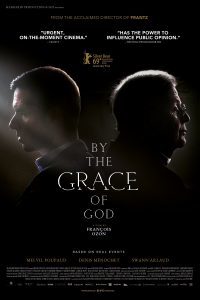
While the film sensitively deals with serious subject matter and becomes steadily more compelling as the narrative plays out, the story overall is sometimes a little too “tame” in addressing its material. What’s more, even though the picture aims to address the personal impact of this story on its principals more so than other such films have, it sometimes becomes bogged down by extraneous anecdotal material that adds little in the way of meaningful content, either in the individuals’ experiences or the larger scenario of which they’re a part. It’s easy to gets the impression that the film’s heart is in the right place but that it isn’t willing to go for the jugular more than it probably should have, perhaps a shortcoming of a French production taking on the French Catholic Church. Although the institution in question may wield considerable power, that doesn’t immunize it against justified scrutiny and criticism, no matter how much good work it may do. Director François Ozon’s offering gives a voice to those who traditionally have not had one, but it simultaneously misses the chance to sufficiently take on an organization that could have – and should have – done more than it did to keep an atrocity from getting out of hand.
“By the Grace of God” recently completed a limited theatrical run and is currently no longer in moviehouses. However, DVD and streaming releases are in the works, with details to follow.
Surviving ordeals like those suffered by the characters in this film may seem impossible at the time we’re going through them. However, by looking within to discover the reserves of strength that reside within us, we can begin the process of liberating this resource and putting it to use for ourselves and others like us. And the miracles its release can work are often truly astounding, bringing much-needed relief, justice and rectification. That’s quite a feat, but then there’s no telling what we can accomplish when we combine our considerable capabilities with those of the grace of God.
Copyright © 2019, by Brent Marchant. All rights reserved.
The post ‘Grace of God’ examines the struggle to liberate trapped courage appeared first on Brent Marchant.
December 2, 2019
Check Out The Cinema Scribe
Tune in for the latest Cinema Scribe segment on Bring Me 2 Life Radio, Tuesday, December 3, at 2 pm ET, available by clicking here. And, if you don’t hear it live, catch it later on demand!



The post Check Out The Cinema Scribe appeared first on Brent Marchant.
November 18, 2019
Check Out The Cinema Scribe
Tune in for the latest Cinema Scribe segment on Bring Me 2 Life Radio, Tuesday, November 19, at 2 pm ET, available by clicking here. And, if you don’t hear it live, catch it later on demand!


The post Check Out The Cinema Scribe appeared first on Brent Marchant.
This Week in Movies with Meaning
Reviews of “Parasite,” “Jojo Rabbit” and “Harriet” are all in the latest Movies with Meaning post on the web site of The Good Media Network, available by clicking here.




The post This Week in Movies with Meaning appeared first on Brent Marchant.
November 17, 2019
‘Harriet’ chronicles a historic fight for freedom
“Harriet” (2019). Cast: Cynthia Erivo, Leslie Odom Jr., Janelle Monáe, Joe Alwyn, Clarke Peters, Vanessa Bell Calloway, Omar J. Dorsey, Henry Hunter Hall, Tim Guinee, Zackary Momoh, Vondie Curtis-Hall, Jennifer Nettles, Deborah Ayorinde, Michael Marunde, Rakeem Laws, Tory Kittles. Director: Kasi Lemmons. Screenplay: Gregory Allen Howard and Kasi Lemmons. Story: Gregory Allen Howard. Web site. Trailer.
The American dream of living a life of freedom is as old as the days of the Founding Fathers. Yet, for many years after the Revolution and the establishment of the new republic, one segment of society was always left out when it came to enjoying such self-evident blessings. The nation’s slave population languished in an unending cycle of forced servitude, unable to break free – except, of course, for a few courageous souls who defied the odds and escaped their circumstances. The inspiring story of one enslaved woman who did just that – and then went on to help many others suffering similar circumstances – provides the basis for the new historic biopic, “Harriet.”
In Dorchester County, Maryland in 1849, 27-year-old Araminta “Minty” Ross (Cynthia Erivo) lives the life of a slave on the plantation of Edward Brodess (Michael Marunde). Having been born into slavery as the daughter of her mother, Rit (Vanessa Bell Calloway), it’s the only life she’s ever known. However, she now seeks to change that by pleading her case for freedom, based on a pledge made by Mr. Brodess’s grandfather, who promised Rit that she (and her offspring) would be freed from their forced servitude upon reaching a certain age, a milestone that has long since passed. What’s more, Minty has recently married a free black man, John Tubman (Zackary Momoh), with whom she’d like to share the legal liberation he enjoys, something they could also pass on to any children that they might have.

Araminta “Minty” Ross (a.k.a. Harriet Tubman) (Cynthia Erivo) seeks freedom from forced servitude by running away from her slave master in the inspiring new biopic, “Harriet.” Photo by Glenn Wilson, courtesy of Focus Features.
After making their case to Edward with the assistance of Minty’s father, Ben (Clarke Peters), also a free black man, Minty and John are summarily turned down. Brodess flatly says he has no intention of honoring his grandfather’s agreement and that Minty, like her mother, will forever remain a slave, despite his ancestor’s pledge and despite her marriage to a free man.
Needless to say, Minty is dejected. But she is also resolute to seek her freedom, contending that it’s immoral for a person to own another human being. The path to such a result is sure to be difficult, but she’s committed to find it one way or another, no matter what it takes.
Shortly thereafter, however, Minty’s plan runs into a major hurdle: Edward dies unexpectedly, leaving his wife, Eliza (Jennifer Nettles), and son, Gideon (Joe Alwyn), with a pile of unpaid debts. Also, given that the farm is not faring as well as expected, the surviving Brodesses are faced with having to raise cash to stay afloat, an objective they hope to achieve by selling off some of their “assets,” namely, slaves like Minty for whom they believe they’ll be able to fetch a good price. Minty is terrified at the prospect, believing that she’ll be sold off and sent down South, keeping her from seeing John and her family members ever again. With such a possibility looming, she decides to run.

Slave owner Gideon Brodess (Joe Alwyn) seeks to recover his runaway “property” in director Kasi Lemmons’s enlightening new biopic, “Harriet.” Photo by Glenn Wilson, courtesy of Focus Features.
Minty meets with her pastor, Rev. Samuel Green (Vondie Curtis-Hall), for guidance. Rev. Green proves to be surprisingly helpful, given that he usually preaches sermons encouraging his parishioners to work hard, remain contrite and obey their slave masters. He instructs Minty to head north to Pennsylvania, a free state in which she can lead a comparatively less restricted life as a free black. In particular, he advises her to head to Philadelphia, an oasis for free blacks and escaped slaves, and to contact the head of the Pennsylvania Anti-Slavery Society, William Still (Leslie Odom Jr.), who can help her make a new life for herself. But, first, she has to get there, an arduous 100-mile journey filled with peril, pursuers and many hardships, all to be accomplished on foot, mostly at night, through the wilderness.
Despite the odds, Minty succeeds in her journey, reaching Philadelphia and meeting Mr. Still. He subsequently introduces her to Marie Buchanon (Janelle Monáe), a free black woman who owns a boarding house for escaped slaves. Marie gives her residents a place to stay and food to eat, as well as assistance in finding paid employment, something Minty has never experienced. She quietly settles into her new life as a free person.
In addition to providing help with everyday considerations, Mr. Still also keeps detailed records about the lives and experiences of the escapees. He chronicles their lives and their paths to freedom, compiling a sort of data base about his constituents. In taking down Minty’s information, he learns that she suffered a severe head injury in her youth, one that subsequently prompted her to have “visions” and vivid dreams, episodes that she believes are communications with God. Mr. Still is somewhat skeptical, chalking up her descriptions of these events to possible brain damage. But Minty is convinced it’s divine inspiration, something that she claims has helped guide her more than a few times, especially during her flight to freedom. She considers this ability a valuable gift for living, one she will come to draw upon many times as she moves forward in life.
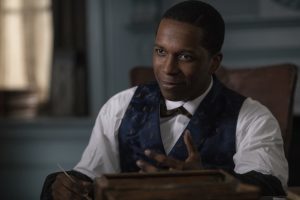
William Still (Leslie Odom Jr.), head of the Pennsylvania Anti-Slavery Society, helps escaped slaves adjust to a life of freedom in Philadelphia in “Harriet.” Photo by Glenn Wilson, courtesy of Focus Features.
Of course, no new beginning would be complete without some kind of gesture to signify its inception. To that end, Mr. Still asks Minty if she would like to take a new name for herself, one of her choosing that suits her desires and celebrates her freedom (and that can help to conceal her true identity from hunters tracking down runaway slaves). She thus chooses one that’s a combination of her mother’s birth name and her own married name. And it’s with that Harriet Tubman is born.
After about a year, though, Harriet finds herself lonely, longing to be with her husband John. She contemplates going back to Maryland to retrieve him so that they can live together in freedom, a plan Mr. Still strongly discourages, due to the dangers involved. He warns her that aggrieved slave owners, like her own former master Gideon Brodess, are growing more aggressive in their efforts to recover their “property,” hiring opportunistic free black bounty hunters like Bigger Long (Omar J. Dorsey) and informants like a shady character named Walter (Henry Hunter Hall) to assist them. However, being resolved to be with John, Harriet forges ahead with her plan, successfully making her way back to Dorchester County.
Unfortunately, upon arrival, Harriet receives some distressing news: Having heard stories that she was killed during her flight to freedom, John believed that she was dead. He subsequently remarried. And, with his new wife now expecting, he can’t bring himself to leave.

Araminta “Minty” Ross (a.k.a. Harriet Tubman) (Cynthia Erivo, right) hopes to create a life of freedom for herself and her husband, John (Zackary Momoh, left), in the new historic biopic, “Harriet.” Photo by Glenn Wilson, courtesy of Focus Features.
Though devastated by this revelation, Harriet comes to a startling realization: Events have unfolded as they have because God must have summoned her to a higher calling, that of helping others escape and shepherding them to freedom. She thus decides to help a group of family members make their flight north, a venture in which she succeeds without losing a single soul.
Harriet’s efforts impress Mr. Still so much that he recommends her to become a member of the Underground Railroad, a covert network of “conductors” who help slaves escape captivity by stealthily leading them from one clandestine “station” (i.e., safe house) to another from the American South to the northern U.S. or southern Canada. It was an effort that earned Harriet her legacy as one of the greatest heroes in American history.
Harriet never would have achieved what she did, however, were it not for her indefatigable fearlessness. Even as far back as her days as a slave under the elder Mr. Brodess, she possessed an unshakable courage to attain what she considered just and right, a conviction that helped make her dream possible. But, then, that comes with the territory when someone holds steadfastly to such potent beliefs, the building blocks of the conscious creation process, the philosophy that maintains we draw upon these powerful tools in manifesting the reality we experience.
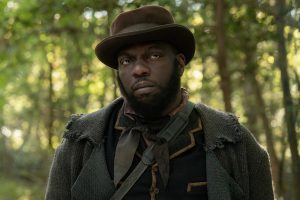
Bounty hunter Bigger Long (Omar J. Dorsey) seeks his fortune by assisting slave masters in capturing runaways in “Harriet.” Photo by Glenn Wilson, courtesy of Focus Features.
In witnessing Harriet’s odyssey, it’s no surprise that she was able to realize her aspirations. Her journey may not have always been an easy one, but, given her steely resolve, it always resulted in the outcome she sought. Whether it was freedom for herself or her family or for the more than 70 slaves whose lives she helped change, she held tight to her vision and let her beliefs be her guide.
But, as important as living courageously was to this effort, it was not the only belief that Harriet drew upon. She also had an unswerving adherence to the principles of individual freedom and the abolition of forced servitude. This idealism, fortified by a hefty infusion of personal integrity, drove her forward in her efforts, making their realization possible. She firmly believed in her views – and herself – a virtually unbeatable combination when it came to the manifestation of her initiatives.
Of course, Harriet was not “alone” when it came to formulating her plans and strategies. She had (or believed she had) divine inspiration on her side to guide her. Whether Harriet was actually speaking to God is open to speculation, but the concept of receiving enlightened guidance is certainly not in doubt. As conscious creators are well aware, we all have access to our intuition in the belief formation process, that indefinable, feeling-based knowing in whose validity we have absolute faith, no matter how unusual it may seem, and that plays a crucial role in the shaping of the thoughts, beliefs and intents we hold. Such intuitional access is what Harriet may well have had at her disposal, even if she didn’t recognize it as such or call it by that name. What’s most important, though, is that she trusted it implicitly, convinced that it would never steer her wrong. And the result is that such reliance served to bolster her confidence in her manifesting beliefs, making it eminently more possible to deliver to her the results she sought.

Widow Eliza Brodess (Jennifer Nettles) worries about the future of her plantation after her deceased husband leaves her with a pile on unpaid debts in the new historic biopic, “Harriet.” Photo by Glenn Wilson, courtesy of Focus Features.
More than anything else, though, Harriet’s convictions made it possible for her to live out her value fulfillment, the conscious creation concept associated with us being our best, truest selves for the betterment of ourselves and those around us. Given Harriet’s track record, it’s easy to see that she was doing what she was destined to do. Her actions certainly benefitted herself and her family, but they also led to better lives for the many people she helped. The world is certainly a better place – even today – for having had someone like Harriet as part of its history, culture and legacy, someone who epitomized value fulfillment in one of its most inspired embodiments.
While the storytelling approach employed in “Harriet” is rather safe and formulaic, director Kasi Lemmons’s heroic biopic nevertheless delivers an inspiring tale of a courageous soul who successfully helped liberate an oppressed people. Erivo delivers a knock-out, award-worthy performance as the celebrated title character, backed by a fine ensemble cast of supporting players, all placed within a fine period piece production design. Admittedly the dialogue is a tad preachy at times, and the film’s overdramatic soundtrack frequently overpowers the mood of many scenes. However, for those seeking uplifting viewing options, especially those that would appeal to impressionable young women, this tribute to Harriet Tubman is well worth the time.
Despite its many fine attributes, “Harriet” has come under attack for some of its historical accuracy. However, viewers must remember that this is a biopic, a film based on historical events, not a literal documentation of the character’s life and times. What’s more, given that some aspects of Harriet’s life are difficult to pinpoint, some gaps had to be filled in with speculation about what may have been true. And it’s on those points that the picture makes some educated guesses, some plausible, some less likely. Those interested in this subject should check out an excellent Slate magazine article by Rachelle Hampton, available by clicking here.

The hunger for freedom is one that’s difficult to satisfy, especially when it’s being starved of sustenance. But it’s under circumstances like that when we’re most motivated to keep persevering to obtain what we seek. Harriet’s story provides us with a shining example of what to do and how to proceed when we have nothing left to lose – and everything to gain.
Copyright © 2019, by Brent Marchant. All rights reserved.
The post ‘Harriet’ chronicles a historic fight for freedom appeared first on Brent Marchant.



